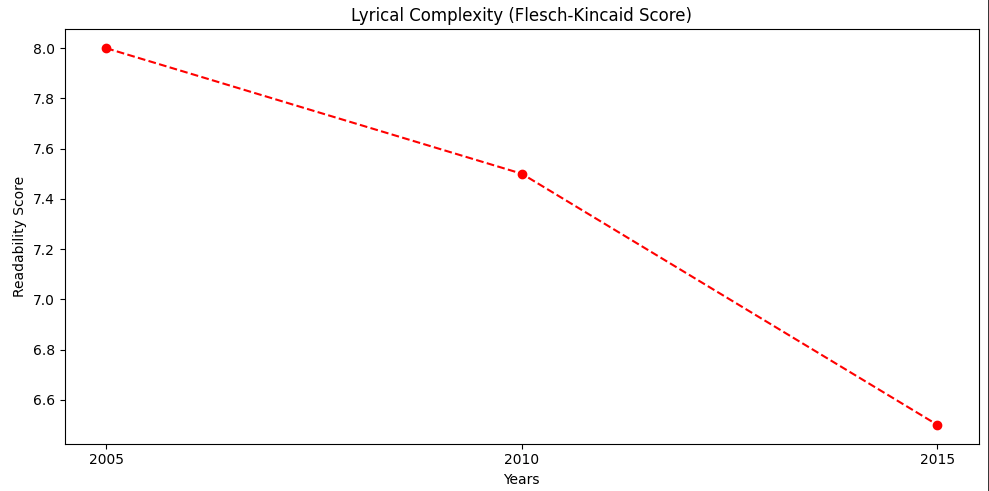What Happened to Music?
If you feel like music has gotten shallow over the last decades, you're not alone. And we might even have proof.
This month’s edition will discuss music, a universal language transcending cultural and linguistic boundaries, which has always played a significant role in human society. Yet, in recent decades, there seems to be a growing sense of disillusionment with contemporary music. It feels shallower, emptier, maybe even simplistic.
This hypothesis arises from a feeling I get from listening to contemporary vs. old music, even though I enjoy both. I'm not saying this from a snobbish point of view—I mean this to be as “objective” as possible.
Also, this is a generalistic analysis from personal reflections, not meant as a critique, and of course, it doesn’t apply to all the music out there.
So, what happened to music? Let’s dive in.
To each their own
Every time I've discussed this with someone who doesn't care much about music (the “casual listener type”), who uses it as background filling for different activities, and who loves whatever's on the “Top 50” list, their answers have always been in the “tastes are subjective” category.
If you feel there must be some objective side, you're not alone! Taste is taste, and it'll always be subjective. There is no argument there; however, like in other arts, such as film, photography, painting, or architecture, music has objective variables.
For example, in my field of architecture, I often find some buildings ugly, but I recognize the depth of the ideas behind them and objectively find those works amazing—even when I don't like them. In music, I argue the same can happen.
Making a quick detour to architecture, take the Taipei Performing Arts Center by OMA, one of my all-time favorite architecture practices:
It's not particularly beautiful in the traditional sense of the word. You may like or dislike it. That's practically irrelevant to the discussion.
The point is there's no denying it has deep meaning and concepts behind it - almost reinventing what a theater can be, a concept from millennia ago.
As they described it:
An ancient art form for civic participation, theater has evolved into the modern world as a vocation of the culturally refined, with its significance in daily life diminished. Theater space is valued for its potency for formal cultural productions, rather than its power to include and divert, and to be instantaneous. Contemporary performance theaters increasingly become standardized: a combination of two different- sized auditoria and a black box, with conservative internal operation principles for authentic work. Can a public theater still be inclusive, accommodating the classic and the serendipitous, the highbrow and the masses, the artistic and the social—a place for the creative life of all?
— Description by OMA
Do we have proof?
Has music gotten shallower, emptier, and with less meaning?
To answer this question, we need to delve into the evolution of music, the impact of technology, and the shifts in cultural and economic landscapes. To truly understand the changes, we'll try to examine variables as objectively as possible, such as content quality, philosophical depth, length, and composition complexity.
The Evolution of Music
Throughout history, music has evolved alongside society. From the classical compositions of Mozart and Beethoven to the revolutionary sounds of rock and roll in the 20th century, each era of music has been a reflection of its time. The 1960s and 1970s, often considered some golden age of music, brought forth a wave of innovation and creativity. Bands and musicians like Muddy Waters, Led Zeppelin, The Rolling Stones, Pink Floyd, and many others pushed the boundaries of what music could be, offering complex compositions and profound philosophical messages, offering an honest perspective about how they viewed the world.
Objective Variables in Music Quality
Composition Complexity
One way to objectively compare music is through its composition complexity. Data from Hooktheory shows that chord progressions in contemporary music are significantly more uncomplicated than those in the 1970s. Songs today often use repetitive patterns and avoid the complex harmonies that were common in earlier decades.
Led Zeppelin and Pink Floyd are renowned for their intricate arrangements and musical experimentation. For instance, Pink Floyd's “Shine On You Crazy Diamond” is a multi-part composition featuring a complex structure that defies conventional song formats.
In contrast, many contemporary hits, such as Bad Bunny's, rely on repetitive structures and simple chord progressions to maximize catchiness and streaming numbers.
Philosophical Depth
Another objective variable is the philosophical depth of the lyrics and overall message. Pink Floyd's “The Dark Side of the Moon” explores themes of mental illness, consumerism, and the human condition with profound lyrical content. They also popularized the concept of “conceptual albums”: an entire album would convey a message and have a consistent narrative, with the prime example of The Wall.
Led Zeppelin's lyrics often drew from mythology, literature, and personal introspection.
On the other hand, much of today's popular music, including reggaeton and trap, tends to focus on themes of materialism, hedonism, and personal success. While these themes resonate with many, they often lack the deeper philosophical inquiries of earlier music.
Lottie's 2024 study revealed a significant decline in the complexity and diversity of lyrics over the decades. Analyzing popular songs from the 1950s to the 2010s shows simpler language and repetitive themes.
The Impact of Technology
The advent of digital technology in the late 20th and early 21st centuries dramatically changed the music landscape. The transition from vinyl records and cassette tapes to CDs and digital downloads marked the beginning of a new era. While this shift made music much more accessible, it also brought significant challenges.
The Influence of Streaming Services
The rise of streaming services such as Spotify, Apple Music, and YouTube has democratized access to music. However, it has also altered how music is consumed and produced. Artists are now incentivized to create shorter, catchier songs that fit within the algorithms of these platforms, leading to a decline in the diversity and complexity of mainstream music. Studies show that songs have become shorter and more repetitive over the past few decades, aiming to capture listeners' attention within the first few seconds.
The Role of Attention Span
One significant factor driving these changes is the reduction in average attention spans. Research indicates that the average human attention span has decreased over the past two decades, influenced heavily by the rapid consumption of digital content. In a world where abundant information and distractions are constant, people often prefer quick and easy-to-digest content. This shift is evident in the music industry, where songs are getting shorter, and hooks are designed to be instantly catchy.
Data Insights
If you like charts, these aren’t great, but you get the point.
Average Song Duration
The average song length has decreased from approximately 3 minutes and 55 seconds in the 1970s to about 3 minutes and 17 seconds in the 2010s.1
Lyrical Complexity
Flesch-Kincaid readability scores suggest that lyrics have become simpler over the decades.2
Chord Complexity
Chord progression analysis indicates a shift towards more superficial, repetitive chord structures in contemporary music.3
I'm not a musician, so this is based on data from other people.
The Decline of Physical Sales
Physical album sales, once a significant source of artist revenue, have plummeted in the digital age. This shift has forced musicians to rely more on touring and merchandise sales to make a living. The pressure to constantly create new content and remain relevant in the fast-paced digital world can stifle creativity and innovation.
The Cultural Shift
Music has always reflected cultural and social dynamics. In recent years, however, the commercialization of music has become more pronounced. The focus has shifted from artistic expression to marketability and profitability. The rise of reality TV shows and social media influencers has further blurred the lines between genuine musical talent and manufactured celebrity.
The Role of Social Media
Social media platforms have given artists unprecedented access to their audiences. While this can be a powerful tool for engagement and promotion, it also means that musicians are under constant scrutiny. The pressure to maintain a public persona and produce content that goes viral can detract from the focus on creating meaningful music.
The Homogenization of Sound
As a result of these cultural and technological shifts, there has been a noticeable homogenization of sound in popular music. Many contemporary hits follow similar formulas and production techniques, creating a sense of sameness, maybe due to a data-driven approach to creating profitable tunes.
The Future of Music
Despite these challenges, there is hope for the future of music. Independent artists and smaller labels are finding ways to innovate and reach audiences through alternative platforms. The resurgence of vinyl records and the growing interest in niche genres suggest that there is still a demand for diverse and authentic music. Also, bands like The Black Keys, Foo Fighters, The Rolling Stones, and many others still rock on, with newer ones like Greta Van Fleet, Royal Blood, and others coming into the scene.
So, what happened to music?
Technological advancements, economic pressures, and cultural shifts have shaped the music industry's current state—it is full of commercial, shallow stuff.
While there are valid concerns about the homogenization and commercialization of music, there are also opportunities for innovation and growth.
By supporting independent artists and embracing diverse musical expressions, we can ensure that music remains a vibrant and vital part of our lives. In an age of shortened attention spans, it's more important than ever to seek out and appreciate the depth and complexity that music can offer.
Digital Music News, Statista.
Powell-Morse, Andrew. "Lyric Intelligence in Popular Music: A Ten Year Analysis." SeatSmart, 2015.
Hooktheory Insights. "Music Analysis Trends Over Decades."









As a massive music lover & concert-goer, I was really interested to read this post. 🎶 My partner and others have raised the same point about today's music being more shallow but I wonder: music is always of its time. So, beyond any technical dissection, today's songwriters, musicians & bands are reflecting their own feelings & understanding of society through they're music. 🤔 And yes I get the influence (or ambush) of AI but for those who create from the heart (I'm thinking Noah Kahan and John Legend right now) who are we to say it's empty or shallow?